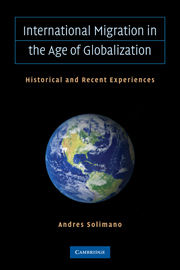Book contents
- Frontmatter
- Contents
- Acknowledgments
- 1 Introduction: Understanding the Trends, Themes, and Strata of International Migration
- 2 Why People Move or Stay Put: International Migration Is the Result of Compelling and Conflicting Factors
- 3 What Happens When International Migration Happens? The Dilemmas Posed by Migration
- 4 How Empires, Policy Regimes, and Economic Imperatives Influenced the Mobility of Capital and People in the 20th Century
- 5 Latin America: Where Volatile Economic Development, Political Crises, Poverty, and Remittance Income Is a Laboratory for Studying the Determinants of International Migration
- 6 Who Migrates and What They Offer: A Focus on People and Elites with Talent, Knowledge, and Entrepreneurial Skills
- 7 A Fair and Orderly International Migration Process Requires a Global Social Contract
- References
- Index
7 - A Fair and Orderly International Migration Process Requires a Global Social Contract
Published online by Cambridge University Press: 05 June 2012
- Frontmatter
- Contents
- Acknowledgments
- 1 Introduction: Understanding the Trends, Themes, and Strata of International Migration
- 2 Why People Move or Stay Put: International Migration Is the Result of Compelling and Conflicting Factors
- 3 What Happens When International Migration Happens? The Dilemmas Posed by Migration
- 4 How Empires, Policy Regimes, and Economic Imperatives Influenced the Mobility of Capital and People in the 20th Century
- 5 Latin America: Where Volatile Economic Development, Political Crises, Poverty, and Remittance Income Is a Laboratory for Studying the Determinants of International Migration
- 6 Who Migrates and What They Offer: A Focus on People and Elites with Talent, Knowledge, and Entrepreneurial Skills
- 7 A Fair and Orderly International Migration Process Requires a Global Social Contract
- References
- Index
Summary
As we mentioned at the outset of the book, international migration evokes emotional responses from many corners. However, the international flow of people is a reality, and the current pace of immigration to OECD countries, perhaps slowing down because of the consequences of the financial crisis and economic slump of 2008–09, is unlikely to be abated in the medium run despite the restrictive immigration policies in place across advanced economies and the irregular nature of part of these flows. A critical need is to shape a global social contract that provides a framework for managing international migration. We have to move beyond defining immigration polices only as a domestic issue, formulated only on a national basis, and treating migration as an international issue, one in which the interests of all players are at stake – the migrants, the governments, employers associations, labor unions and civil society organizations in origin countries and destination nations. It is increasingly clear that immigration is an integral part of global economic relations that include the mobility of goods, money, capital, and people. But while the current globalization process is perhaps obsessed with objects (goods, capital, technology, and money), it casts aside those who should be at the center of a more humane economic system – people themselves. Moreover, migration policies must be treated not just as a legal issue of entry and exit of people; they must also endeavor to capture the broader developmental context of a world in which large income disparities and developmental gaps create powerful incentives for migration toward wealthy countries.
- Type
- Chapter
- Information
- International Migration in the Age of Crisis and GlobalizationHistorical and Recent Experiences, pp. 190 - 206Publisher: Cambridge University PressPrint publication year: 2010



